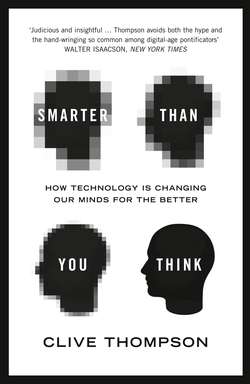Smarter Than You Think: How Technology is Changing Our Minds for the Better

Реклама. ООО «ЛитРес», ИНН: 7719571260.
Оглавление
Clive Thompson. Smarter Than You Think: How Technology is Changing Our Minds for the Better
Copyright
From the reviews of Smarter Than You Think:
Dedication
The Rise of the Centaurs_
We, the Memorious_
Public Thinking_
The New Literacies_
The Art of Finding_
The Puzzle-Hungry World_
Digital School_
Ambient Awareness_
The Connected Society_
Epilogue_
Notes
Index
Acknowledgments
About the Author
About the Publisher
Отрывок из книги
‘We should be grateful to have such a clear-eyed and lucid interpreter of our changing technological culture as Clive Thompson. Smarter Than You Think is an important, insightful book about who we are, and who we are becoming’
Joshua Foer, New York Times bestselling author of Moonwalking with Einstein
.....
Given the pattern-finding nature of computers, one can imagine increasingly sophisticated ways that our tools could automatically reconfigure and re-present our lives to us. Eric Horvitz, a Microsoft artificial intelligence researcher, has experimented with a prototype named Lifebrowser, which scours through his massive digital files to try to spot significant life events. First, you tell it which e-mails, pictures, or events in your calendar were particularly vivid; as it learns those patterns, it tries to predict what memories you’d consider to be important landmarks. Horvitz has found that “atypia”—unusual events that don’t repeat—tend to be more significant, which makes sense: “No one ever needs to remember what happened at the Monday staff meeting,” he jokes when I drop by his office in Seattle to see the system at work. Lifebrowser might also detect that when you’ve taken a lot of photos of the same thing, you were trying particularly hard to capture something important, so it’ll select one representative image as important. At his desk, he shows me Lifebrowser in action. He zooms in to a single month from the previous year, and it offers up a small handful of curated events for each day: a meeting at the government’s elite DARPA high-tech research department, a family visit to Whidbey Island, an e-mail from a friend announcing a surprise visit. “I would never have thought about this stuff myself, but as soon as I see it, I go, ‘Oh, right—this was important,’” Horvitz says. The real power of digital memories will be to trigger our human ones.
In 1942, Borges published another story, about a man with perfect memory. In “Funes, the Memorious,” the narrator encounters a nineteen-year-old boy who, after a horse-riding accident, discovers that he has been endowed with perfect recall. He performs astonishing acts of memory, such as reciting huge swathes of the ancient Roman text Historia Naturalis and describing the precise shape of a set of clouds he saw several months ago. But his immaculate memory, Funes confesses, has made him miserable. Since he’s unable to forget anything, he is tortured by constantly recalling too much detail, too many minutiae, about everything. For him, forgetting would be a gift. “My memory, sir,” he said, “is like a garbage heap.”
.....